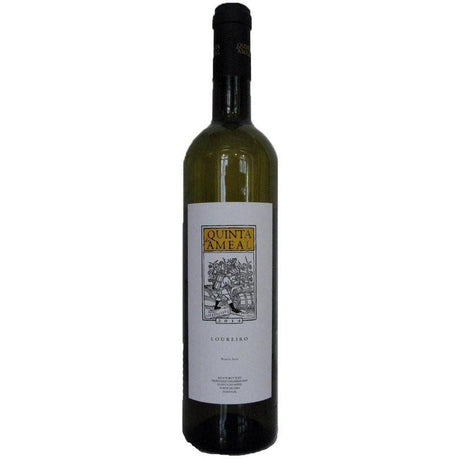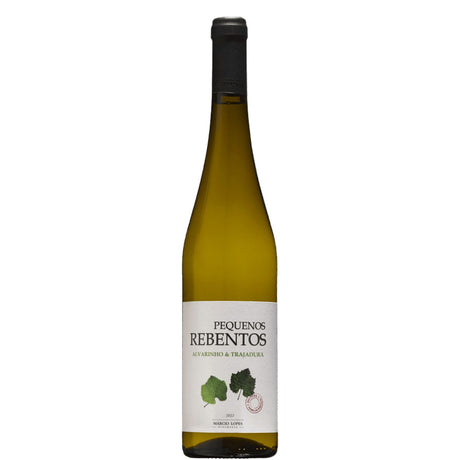Quinta do Ameal Loureiro Blanco 2023
$54.25Unit price /Unavailableor $51.54 in case of 6 bottles.-
 Red Wine
Red Wine
-
 White Wine
White Wine
-
 Rosé Wine
Rosé Wine
-
 Champagne & Sparkling
Champagne & Sparkling
-
 Dessert, Sherry & Port
Dessert, Sherry & Port
 France
France Italy
Italy Spain
Spain Australia
Australia New-Zealand
New-Zealand Germany
Germany Austria
Austria Portugal
Portugal South-Africa
South-Africa Greece
Greece USA
USA
-
 Wine GiftA great wine gift.
Wine GiftA great wine gift. -
 Green WineA wine made using sustainable, organic and/or biodynamic practices in
the vineyard and the winery.
Green WineA wine made using sustainable, organic and/or biodynamic practices in
the vineyard and the winery. -
 CollectibleA wine that will improve and possibly increase in value with
careful cellaring.
CollectibleA wine that will improve and possibly increase in value with
careful cellaring. -
 BoutiqueA wine from a small, artisanal winery.
BoutiqueA wine from a small, artisanal winery. -
 Screw CapNo corkscrew required to open.
Screw CapNo corkscrew required to open. -
 Magnum1500ml bottle.
Magnum1500ml bottle.
- TWFThe Wine Front
- JHJames Halliday
- WWWorld Wine
- WSWine Spectator
- WEWine Enthusiast
- BHAllen Meadows
- JSJames Suckling
- DEDecanter
- JRJancis Robinson
- STStephen Tanzer
- AGAntonio Galloni/Vinous
- RPRobert Parker/Wine Advocate
- HHHuon Hooke
-
Pequenos Rebentos Alvarinho-Trajadura 2022
$44.18Unit price /Unavailableor $41.97 in case of 6 bottles.-
 Red Wine
Red Wine
-
 White Wine
White Wine
-
 Rosé Wine
Rosé Wine
-
 Champagne & Sparkling
Champagne & Sparkling
-
 Dessert, Sherry & Port
Dessert, Sherry & Port
 France
France Italy
Italy Spain
Spain Australia
Australia New-Zealand
New-Zealand Germany
Germany Austria
Austria Portugal
Portugal South-Africa
South-Africa Greece
Greece USA
USA
-
 Wine GiftA great wine gift.
Wine GiftA great wine gift. -
 Green WineA wine made using sustainable, organic and/or biodynamic practices in
the vineyard and the winery.
Green WineA wine made using sustainable, organic and/or biodynamic practices in
the vineyard and the winery. -
 CollectibleA wine that will improve and possibly increase in value with
careful cellaring.
CollectibleA wine that will improve and possibly increase in value with
careful cellaring. -
 BoutiqueA wine from a small, artisanal winery.
BoutiqueA wine from a small, artisanal winery. -
 Screw CapNo corkscrew required to open.
Screw CapNo corkscrew required to open. -
 Magnum1500ml bottle.
Magnum1500ml bottle.
- TWFThe Wine Front
- JHJames Halliday
- WWWorld Wine
- WSWine Spectator
- WEWine Enthusiast
- BHAllen Meadows
- JSJames Suckling
- DEDecanter
- JRJancis Robinson
- STStephen Tanzer
- AGAntonio Galloni/Vinous
- RPRobert Parker/Wine Advocate
- HHHuon Hooke
-
Frequently Asked Questions
What is Portuguese wine
What is Portuguese wine
Portuguese wine is produced in Portugal, located in southwestern Europe, on the Iberian Peninsula. Portugal has a long history of winemaking, dating back to the Roman Empire and is known for its unique grape varieties, such as Touriga Nacional, Albarinho and Tinta Roriz. The production of fortified wines, such as Port and Madeira, made Portugal famous, but the country is now a source of fantastic dry table wines. The wine regions of Portugal are divided into several sub-regions, each protected by an appellation for their unique terroir and grape varieties. Some of Portugal’s most famous wine regions include the Douro Valley, Dao, Alentejo, Lisboa and Vinho Verde. Portuguese wine is unique because it doesn’t rely on international varieties, such as Cabernet and Chardonnay, but on its own grapes — some only found in the country.
What are the most popular Portuguese wines?
What are the most popular Portuguese wines?
Winemakers in Portugal produce a wide variety of wines. Still, some of the most popular include the fortified Port and Madeira, which are typically sweet and served as a dessert wine. Vinho Verde, made in Portugal’s humid north, is an easy to drink white wine and an affordable alternative that has become increasingly famous. Douro red wines, made in the same region as Port but in a dry style, are amongst the best in the country.
What are the different types of Portuguese wine?
What are the different types of Portuguese wine?
Portugal produces various wines, including red, white, rosé, sparkling and fortified wines like Port and Madeira. Some of the most popular grape varieties used in Portuguese winemaking include Touriga Nacional, Tinta Roriz, and Alvarinho. The wine regions of Portugal vary in size and commercial significance, but they all offer distinct wine styles, often deliciously compatible with the country’s highly regional cuisine.
What are the best Portuguese wines?
What are the best Portuguese wines?
Portugal produces many high-quality wines, but the ones that compete with the best in the world often come from the Douro Valley, where Touriga Nacional and others grow on steep, terraced vineyards overlooking the Douro River. The region’s wineries, also known as Quintas, produce sweet Port and, more recently, red table wine. Some of the best wine in Portugal comes from this exciting region and includes Quinta do Noval Vintage Port, Ramos Pinto Duas Quintas, Niepoort ‘Vertente’ Tinta Amarela Blend, and Niepoort Ruby Port. These wines are known for their complexity, depth of flavour, and ability to age well. Other notable Portuguese wines include Frasqueiras Reservas Pereira D’Oliveiras, Fonseca Bin 27, and Quinta do Vallado Douro Tinto. When choosing a Portuguese wine, it’s essential to consider the grape variety, the region and the winemaker’s style. Although Portuguese wine’s quality is overall high, winemakers also produce ordinary wines for everyday enjoyment, which are less expensive than their more sought-after bottles.


